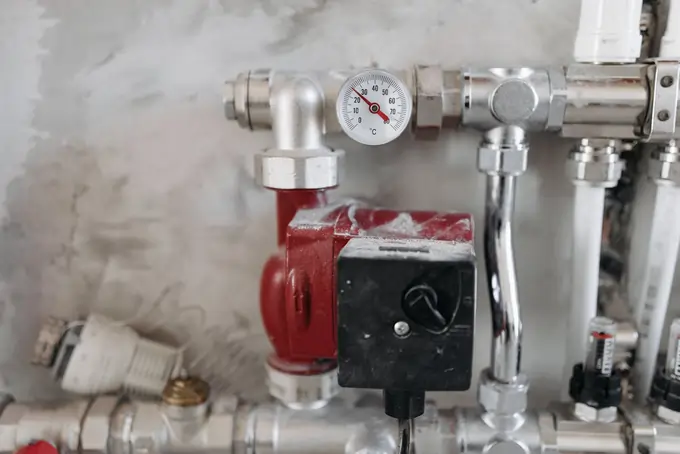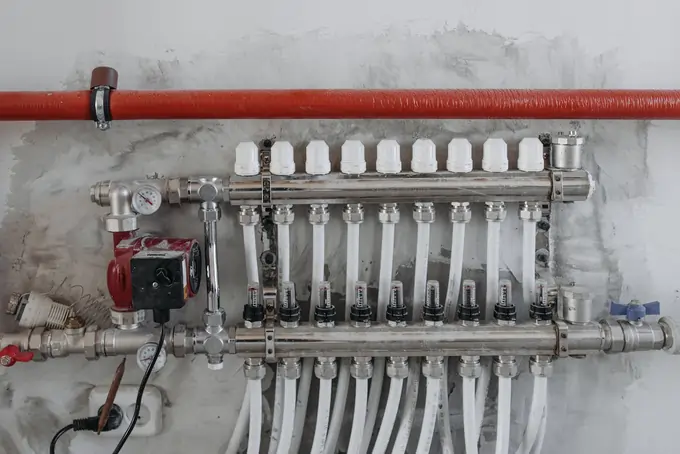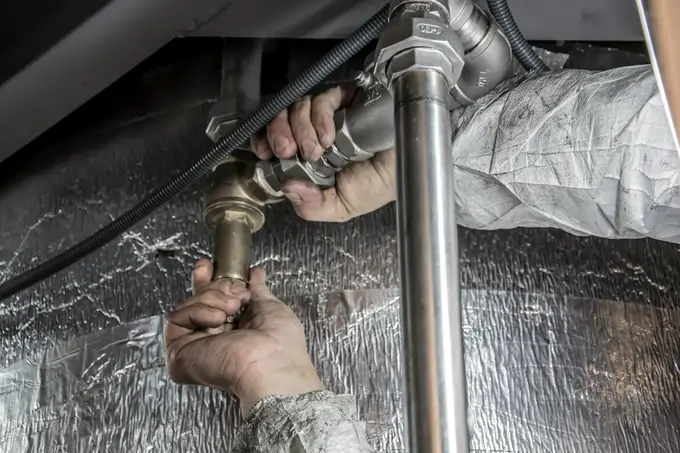Are you a general contractor facing plumbing challenges on your latest project?
Worried about finding the right plumbing contractor to get the job done efficiently and up to code?
You’re not alone.
Many general contractors struggle to find reliable plumbing professionals who can handle complex systems and meet tight deadlines.
But don’t worry – we’ve got you covered.
In this comprehensive guide, we’ll walk you through everything you need to know about choosing the perfect plumbing contractor for your next job.
What do General Contractors Look for When Hiring a Plumbing Contractor?
When it comes to hiring a plumbing contractor, general contractors are pretty particular. They need a plumber who’s reliable and can handle all types of work. So, what’s the difference between an unlicensed and a licensed plumber? Well, experience and credibility are key.
A licensed general building contractor, who usually oversees projects that might include roofing or plumbing work, would likely recommend a plumbing contractor who’s trustworthy. But he is the kind of contractor who can do the job efficiently. A contractor may perform roofing today and plumbing repairs tomorrow.
But if you want to hire a contractor safely, it’s best to hire a licensed one. They have the pedigree. A contractor to contract for your needs should be vetted. A licensed general building contractor won’t settle for less. Like, legit building contractors check credentials before they subcontract.
Don’t just hire any unlicensed bidder out there. Go with a licensed plumbing contractor. This choice ranges from general contractors to specialized ones who ensure that all tasks are handled effectively. So, the smart move is to always hire a contractor licensed for the work you need!
1. Contractor Qualifications
When it comes to plumbing services, not all contractors are created equal.
General contractors need to look for specific qualifications to ensure they’re hiring the right person for the job.
A licensed plumbing contractor brings expertise that goes beyond basic plumbing skills.
They understand complex plumbing systems and can handle a wide range of plumbing needs.
2. Essential Skills
Plumbing contractors are trained professionals who specialize in plumbing work.
They possess skills that set them apart from general plumbers.
These skills include:
- Ability to read and interpret blueprints
- Knowledge of local building codes and regulations
- Experience with commercial plumbing projects
- Expertise in handling large-scale plumbing installations
A skilled plumbing contractor can tackle everything from new construction to complex remodels.
3. License and Insurance
One of the most critical steps in hiring a plumbing contractor is verifying their license and insurance.
A licensed contractor is legally allowed to perform work on a building and has met specific state requirements.
In California, for example, the Contractors State License Board (CSLB) licenses contractors.
Always ask to see proof of a current license before hiring.
Additionally, ensure the contractor has workers’ compensation insurance and liability coverage.
This protects you if someone is injured while on your property or if property is damaged during the project.
Do You Need to Hire a Plumbing Contractor vs a Plumber?

Trying to figure out if you need to hire a plumbing contractor or just a regular plumber? Well, plumbing contractors handle the big stuff. They’re pros at taking care of entire projects.
Think of them like building contractors who usually oversee projects; they need contracts to perform work. They might do some general engineering and carpentry work under one contract. If they need extra help, they’ll hire a subcontractor for tasks that involve specific trades.
On the flip side, plumbers usually tackle plumbing jobs. You can think of them as specialty contractors for smaller gigs like fixing leaks. They’re usually the first ones to dive into those considered minor repairs and expect payment on the day of service. It’s super crucial that you get an appropriate accommodation for a licensed pro, especially if it’s related to tasks that involve requirements of the Americans with Disabilities Act.
So, should you call a contractor or a plumber? If it’s a big construction thing or something new, go with the contractor. For quick repairs, your friendly neighborhood plumber is the way to go!
Difference Between Plumbers and Plumbing Contractors
Understanding the difference between a plumber and a plumbing contractor is crucial.
Plumbers typically handle day-to-day repairs and installations of common plumbing fixtures.
They’re usually the first call for a clogged drain or leaky faucet.
Plumbing contractors, on the other hand, manage larger projects and oversee entire plumbing systems.
They often work with natural gas lines, sewage systems, and complex water distribution networks.
When to Hire a Plumbing Contractor
You may want to hire a plumbing contractor for:
- New construction projects
- Major renovations or remodels
- Commercial plumbing installations
- Projects requiring multiple plumbers or specialized equipment
If your project involves more than just fixing a common plumbing problem, a plumbing contractor is likely your best bet.
Plumbing Work Involving Specialty Licenses
Some plumbing tasks require specialty licenses.
For example, work involving fire sprinkler systems or medical gas piping often needs contractors with particular specialty certifications.
Always check if your project requires any specialty work and ensure your chosen contractor holds the appropriate licenses.
How to Find the Best Plumbing Contractor for Your Needs?
Finding the best plumbing contractor for your needs can be tricky. First off, make sure to get a plumber who’s licensed. One of the biggest misconceptions is that building contractors usually oversee projects involving plumbing, but that’s not always true. You have to contract for and oversee the work yourself sometimes.
Don’t think you need someone who works exclusively with new construction. Many experienced plumbers are usually the first choice for any project. Just remember that these service professionals expect payment, which will typically be deducted from the total combined labor and materials costs.
By following these few guidelines to use when you begin searching, you can minimize the financial risk and other problems associated with unlicensed plumbers. Trust me, you don’t want to deal with the risk and other problems associated with hiring anyone who contracts to perform plumbing work without proper credentials.
Searching and Shortlisting Plumbing Companies

Start your search by looking for reputable plumbing contractors in your area.
Use online directories, ask for recommendations from other contractors, or consult professional associations.
Create a shortlist of potential candidates based on their qualifications and experience. Don’t just settle for the first name you find – take the time to research and compare options.
Experience and Reviews
Once you have a shortlist, dig deeper into each contractor’s background.
Look for reviews from past clients and other general contractors.
Check how long they’ve been in business and what types of projects they typically handle. A contractor with a solid track record and positive reviews is more likely to deliver quality work.
Interviewing Potential Contractors
After narrowing down your list, set up interviews with your top choices.
This is your chance to ask detailed questions about their experience, approach to project management, and handling of potential issues.
Pay attention to how well they communicate and whether they seem knowledgeable about your specific project needs.
What Are the Key Questions to Ask a Plumbing Contractor Before Hiring?
Looking to hire a plumber or plumbing contractor? Here are some key questions to keep in mind. First, ask if the building contractors usually oversee projects or if they work or perform the tasks themselves. Clarify if they’ll contract for and oversee the entire job or exclusively with new installations. Remember, plumbers are usually the first on the scene, so you’ll want experienced ones.
Discuss payment details—plumbers expect payment to cover combined labor and materials costs. This can be deducted from the total project’s cost. It’s a good idea to meet with a few service professionals to find the right fit.
One of the biggest misconceptions people have is not getting a clear contract. Use these guidelines when vetting potential plumbers. Lastly, ensure they are licensed to avoid any financial risk and other problems often associated with unlicensed work.
If anyone who contracts to perform plumbing work seems shady, run the other way to avoid unforeseen risk and other problems associated with their service.
Past Plumbing Work and Projects
Ask potential contractors about their experience with projects similar to yours. Request examples of past work and references from previous clients. Inquire about any challenges they’ve faced on similar projects and how they overcame them. A contractor who can provide detailed answers and examples is likely to have the experience you need.
Inquiring About Licensing and Specialty
Don’t hesitate to ask for proof of licensing and any relevant specialty certifications.
Verify that their license is current and in good standing.
Ask about their familiarity with local building codes and regulations. A reputable contractor will be transparent about their qualifications and happy to provide documentation.
Understanding Their Approach to Project Management
Discuss how the contractor plans to manage your project.
Ask about their timeline, communication methods, and how they handle unexpected issues.
Inquire about their team structure and whether they plan to use subcontractors. A well-organized contractor with a clear project management approach is more likely to complete your job efficiently and effectively.
How to Ensure Your Plumbing Contractor Performs Quality Work?
To get quality work, know that plumbers expect payment for their services, including both labor and materials costs. Make sure your plumber is legit—they must hold a current license. Otherwise, they might pose a risk, and you’ll probably end up paying more later.
Good plumbers usually oversee projects and coordinate all the needed tasks. If they hire subcontractors for a job, ensure they oversee the entire project to avoid any mess-ups. Keeping this in mind can save you from paying more in the long run!
Setting Clear Expectations and Agreements
Before work begins, establish clear expectations and agreements with your chosen contractor.
This should include:
- Detailed scope of work
- Project timeline
- Payment schedule
- Materials to be used
- Warranties or guarantees offered
Put everything in writing to avoid misunderstandings later.
Monitoring the Project and Communicating Regularly
Stay involved throughout the project by:
- Scheduling regular check-ins with the contractor
- Requesting progress updates
- Being available to answer questions or make decisions
Open communication helps prevent issues and ensures the project stays on track.
Handling Disputes and Ensuring Satisfaction
If problems arise, address them promptly and professionally. Refer back to your written agreement to resolve disputes. Don’t make the final payment until you’re satisfied with the completed work.
A quality contractor will work with you to ensure your satisfaction with the final result.
By following these guidelines, general contractors can find and work effectively with plumbing contractors who will deliver high-quality results.
Remember, taking the time to choose the right plumbing contractor can save you time, money, and headaches in the long run. Don’t rush the process – your project’s success depends on making the right choice.
Whether you’re tackling a small remodel or a large-scale commercial project, the right plumbing contractor can make all the difference. Use this guide to navigate the selection process with confidence and set your project up for success from the start.


